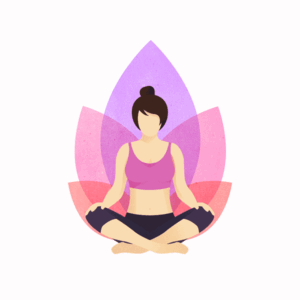Meditation: A simple, fast way to reduce stress
Meditation is a practice that involves training your mind to focus and become more aware of your thoughts and emotions. It’s like a mental workout for your brain that involves training the mind to focus and become more aware of the present moment. It has been used for thousands of years in many different cultures and spiritual traditions as a way to cultivate inner peace, clarity, and a deeper understanding of oneself and the world.
When you meditate, you typically sit in a quiet and comfortable place, close your eyes, and try to focus your attention on your breath or a specific object, song, or mantra. As you do this, you’ll likely notice that your mind starts to wander and get distracted by various thoughts, sensations, and noises.
The goal of meditation is not to suppress these distractions, but rather to observe them without judgment and gently bring your attention back to your breath or chosen focus point. Over time, this can help you develop greater mindfulness and self-awareness, reduce stress and anxiety, improve focus and concentration, and cultivate more positive emotions like compassion and gratitude. Regular meditation practice has been shown to have many health benefits and also help to improve mental clarity and focus, increase self-awareness, and promote greater emotional balance and well-being. There are many different types of meditation, and it’s a very personal practice, so what works for one person may not work for another. But with regular practice, meditation can become a valuable tool for cultivating a greater sense of inner peace and well-being.
Type Of Meditation
They may ask you to focus on your breath, imagine a peaceful scene or situation, or repeat a specific phrase or mantra to help calm the mind and body. Someone assisting you in understanding the dynamics of the mind and how they are likely to act during meditation improves performance.
Guided Meditation
Guided meditation is a type of meditation where a trained practitioner or instructor guides you through the process of meditation using verbal cues and instructions. It can be a great way to start a meditation practice, especially if you are new to meditation or find it difficult to focus on your own. By having led by a teacher will help you to understand better why you are performing such and such tasks. It is always best to grasp what we are achieving through meditation before embarking on what is going to be a lifetime path.
During a guided meditation, the instructor will usually ask you to find a comfortable seated or lying position and then lead you through a series of visualizations and relaxation techniques.


Meditating on your own
Meditating on your own refers to the practice of meditating without the presence or guidance of a teacher or group. In this practice, the individual sits in a quiet and comfortable place, typically with their eyes closed, and focuses their attention on a particular object or sensation, such as their breath or a mantra. The goal is to cultivate a state of inner calm and mental clarity by training the mind to become more focused and less reactive to distractions. Meditating on your own can be a deeply rewarding practice, allowing you to develop a deeper understanding of your own mind and to cultivate greater self-awareness.
It can also be a challenging practice, as the mind often tends to wander and can be difficult to quiet without the guidance of a teacher. However, with regular practice and patience, many people find that they are able to deepen their practice and experience a greater sense of inner peace and well-being.
Benefits

Meditation for Better Health
Meditation is a powerful tool for improving physical health. It can lower blood pressure, relieve stress, and help in the management of chronic pain. It can also help to strengthen the immune system and promote sound sleep. Individuals can find relief from physical and emotional tension that can lead to a variety of health conditions by focusing on breathing and slowing down their thoughts.

Meditation for Improved Mental Health
Meditation has been shown to have considerable mental health benefits. Anxiety, depression, and stress symptoms can all be reduced with regular practice. It can also help with focus and attention, as well as cognitive functioning. Individuals can build stronger emotional resilience and the ability to manage difficult events more effectively by fostering a sense of serenity and inner peace.

Meditation for Improved Relationships
Meditation can have a positive impact on personal relationships. By developing greater emotional awareness and empathy, individuals can communicate more effectively and connect with others on a deeper level. Meditation can also help to reduce conflicts and promote more harmonious relationships, both in personal and professional settings.

Meditation for Greater Productivity
Meditation can also help individuals to be more productive. By cultivating focus and concentration, individuals can work more efficiently and with greater clarity. Meditation can also help individuals to better manage their time and prioritize tasks, leading to increased productivity and success.

Meditation for Increased Creativity
Meditation has been shown to have considerable mental health benefits. Anxiety, depression, and stress symptoms can all be reduced with regular practice. It can also help with focus and attention, as well as cognitive functioning. Individuals can build stronger emotional resilience and the ability to manage difficult events more effectively by fostering a sense of serenity and inner peace.
What Our Client’s say

Nancy
Paralegal (Mother of 4)
“I had the pleasure of working with Caitlin to help me with my daughter’s nutrition needs, and I can confidently say that she was incredibly helpful and knowledgeable. She took the time to really listen to our concerns and understand her goals, and then tailored a nutrition plan specifically for her. She was always available to answer my questions and provide guidance and support, and her passion for nutrition was contagious. Thanks to Caitlin’s expertise and support, my daughter has been able to make significant progress towards my goals and feel more confident and energized than ever before. I highly recommend her to anyone looking for personalized nutrition support!”

Jason
CEO (Father of 3)
“I had the pleasure of working with Jeff to help me with my fitness needs, and I can confidently say that he was an amazing trainer. He was knowledgeable, patient, and encouraging throughout our sessions, always pushing me to reach my goals while also ensuring that I was comfortable and safe during each exercise. Jeff was great at explaining proper form and technique, and he tailored each workout to my specific needs and abilities. Thanks to Jeff’s guidance and support, I have been able to make significant progress towards my fitness goals and feel more confident and energized than ever before. I highly recommend him to anyone looking for personalized fitness support!”

Mike
Recruiter (father of 2)
“I have been visiting the VivaLatranquility.com website for some time now, and I must say that it has been a game changer for my mental health. The resources, advice, and tips provided on the website are incredibly helpful, practical, and informative. Whether it’s tips for reducing stress and anxiety, meditation techniques, or guidance on improving sleep quality, the website has something for everyone. I have noticed a significant improvement in my mental health since following the advice given on the website. The website’s easy-to-use layout and visually appealing design make it a pleasure to use. I highly recommend Viva La Tranquility to anyone looking to improve their mental health and well-being. Thank you for the amazing work!”

Mary Beth
Business owner (mother of 1)
“I stumbled upon the solfeggio frequencies YouTube videos by VivaLatranquility.com, and I must say that they have had a significant impact on my mental and emotional well-being. The calming music and unique healing frequencies used in the videos have helped me to reduce stress and anxiety and have even improved my sleep quality. I find that listening to the solfeggio frequencies before bedtime helps me to relax and unwind, which has led to better sleep and improved energy levels during the day. Overall, I highly recommend the VivaLatranquility.com YouTube videos to anyone looking for natural and effective ways to improve their mental and emotional well-being.”
